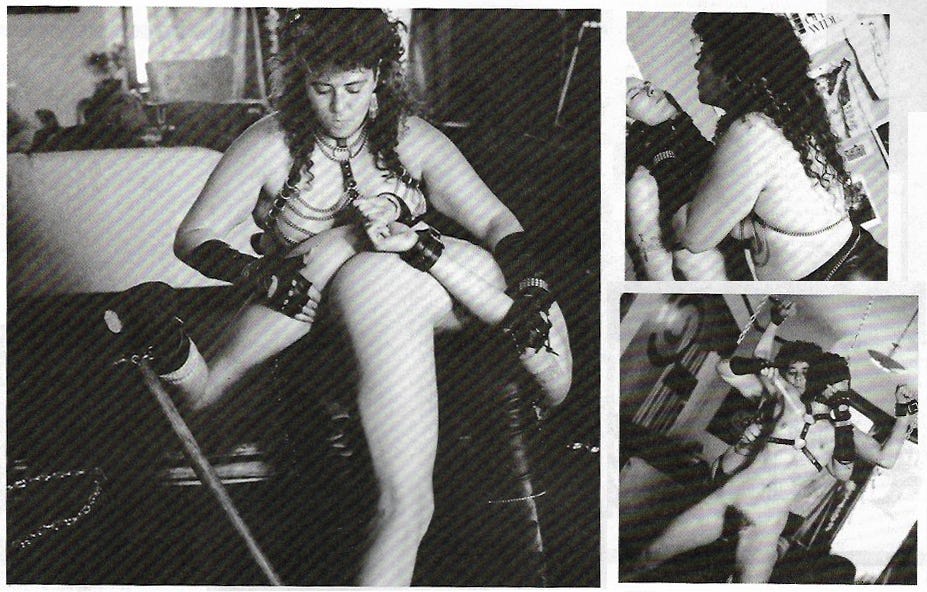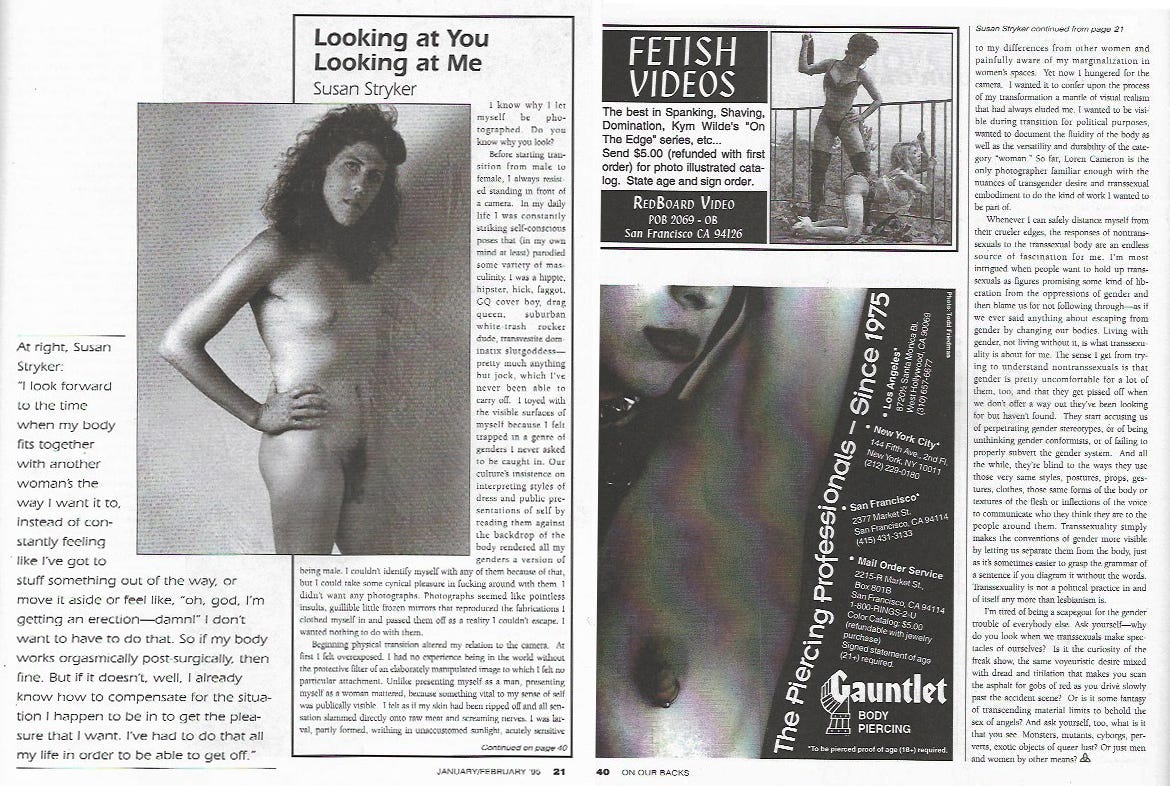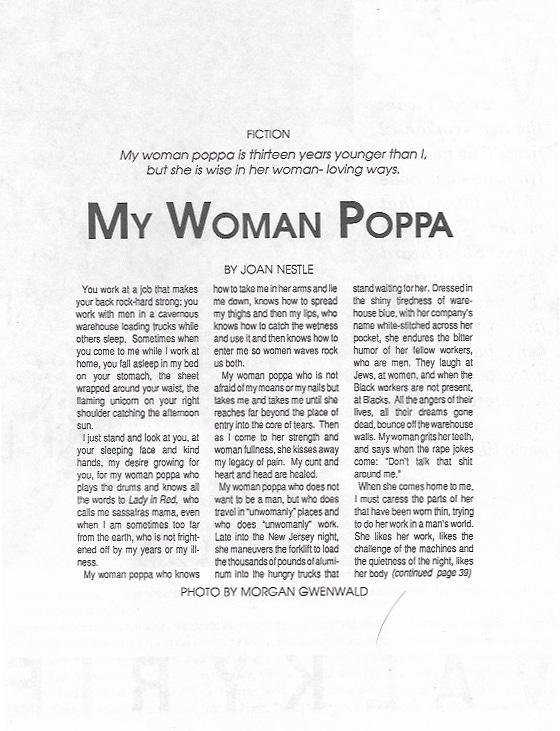The three most controversial books among queer community are The Argonauts, Pleasure Activism, and Conflict Is Not Abuse. In case you’re new here, I’d like to make my position on these polarizing books very clear—CINA is required reading for me while the other two have big pink pussy hat energy. Extensive google searches and scouring Goodreads shows that the two books I hated have basically only received glowing reviews. I can’t really put my finger on why other than to say there’s a weaponized softness here that’s very indicative of the times.
I tweeted about this the other day, as I do, and someone asked, as they do: Why is The Argonauts bad? (God forbid I make a claim and actually back it up lol) Honestly, one does not simply read The Argonauts and ask why it is bad!!! These types of media are polarizing to me in a way I feel almost militant about. Again and again the way in which I engage critically with queer media can only be summarized with one response— I’m a leatherdyke. Reading the really weird way a cis author handles the gender of her trans partner while coding pregnancy as a thing reserved for women (read: cis) and then not understanding why this is bad, is … bad!
I haven’t read The Argonauts since it came out in 2015. I read the memoir about marriage and pregnancy, two things that I could not be less interested in, begrudgingly because literally everyone was raving about it. It has 4 stars on Goodreads!! What my peanut brain does remember, and what was half-heartedly supported by the one (1) critical review I could find online, is that it is straight up embarrassing for someone to have written it. Embarrassing to write about fumbling through (errr, exploiting?) the gender transition of your partner when you could just do better. Embarrassing to appropriate a Native American name for your (expensively conceived) child when you could just not. The embarrassing vibe to me is the same (but different) feeling I get when heterosexual women write think pieces about how much they hate being heterosexual when they could also just not! It pretends to be self aware without closing the loop of simply being a better person, which is especially disgusting when coming from someone with a ton of privilege.
The community I’m part of doesn’t prop up cissexism. I’ve gained a critical lens from discussing and reading and engaging in criticism from people whose perspectives I trust. I always want to do better as a cis person, and the legacy of being a leatherdyke constantly complicates gender in a way that makes it very clear when someone can’t handle a super chill idea like genitals don’t equal gender. Stepping into leatherdyke community, it’s a totally normal thing to reimagine gender in ways that might make people’s heads spin—a woman daddy fucks his creature boy in both of it’s cunts at once. This is the perspective with which I engage with the world and I have no time for modern queerness or feminisms that severely lack gender imagination or project notions of respectability onto bodies.
I was sent some academic papers about leather a few months ago and just got around to reading them (thank you Athénaïs). What a treat for me to have saved these to devour in my unemployed leisure time! Both of these papers discuss the dungeon and SM as (trans)gender technologies, which among so many other feelings got me missing play parties pretty hard. Especially within the context of dungeon space being a tool for gender exploration—there’s so much life-affirming that we’re missing out on by having our social spaces closed for so long. I love looking around a dungeon and seeing all different roles, and rhythmic moving bodies, and outfits, and hearing pleasure screams... It’s almost taboo to talk about all the things we miss because the world is on fire and people are dying. We can hold all of these truths at once. Pleasure is important, especially in times of crisis. I am thinking about what Tourmaline calls Freedom Dreaming. What do we have that we want to keep? I am thinking about what I want from erotic spaces like play parties when we are able to have them again.

On Our Backs Sept /Oct 1990
Glorious, perverted fun aside—the world of queer play parties is troubled by gender policies. There are usually parties for men (some trans inclusive, some not), and one for non-cis-men (usually suspicious of anyone who doesn’t look a certain way). These gender policies are highly controversial for a few reasons, the main one against Gender Cops. “Women only parties” of the past have since become “no cis men,” which usually gets enforced as “no trans feminine people who don’t pass as cis.” Anyone impacted by gendered violence can understand why people may want to exclude cis men from sexual and erotic spaces reserved for queers who are not-cis-men. However, policing gender is gross and creates a false sense of safety in spaces where we know that unsafe players have no gender. Lastly, the fact is that if you advertise a dyke play party, the dykes are going to show up, so what is the real goal here?
Being a leatherdyke, or a dyke in general, is sometimes hard for me to describe even though I feel it deeply in my body. It’s like lesbian, but not. It’s like queer, but also not. It has a bite to it. Last Fall at a Dyke TV screening here in Brooklyn, Ann Northrop said that being a dyke is about lust. Me and my friends cheered, I may have cried a little, and I have definitely been thinking about it ever since. The carnal lust of it all explains why leatherdyke spaces, unlike many capital L Lesbian spaces, have historically made the political choice of welcoming trans women as dykes when they could have easily taken the violent Mitchfest route. Leatherdykes have been fucking with gender since the very beginning and not just in a nice palatable way that larger society is just starting to accept—but in deliciously fucked up, perverted, three dimensional ways. That’s not all, we have also cultivated an entire social landscape that prioritizes the wide range of pervert genders created and recognized in community over the limited options imposed by society.
This introduces the idea of dungeons and/or play parties as a form of radical gender technology that is created specifically through leatherdyke sociality. In Leatherdyke Boys and Their Daddies: How to Have Sex without Women or Men, C. Jacob Hale explores how “leatherdyke genderplay functions as a means for gender interrogation, solidification, resistance, destabilization, and reconfiguration.” He discusses how his relationship to a leather Daddy in the role of leather boy in leatherdyke community in 1990s Los Angeles led him to eventually transition. I wouldn’t say that leather’s primary role is to function as a gender playground, but in looking at it as a form of technology we see it indeed serves many purposes.
“Is a leatherdyke daddy a woman or a man? Is a leatherdyke boy a woman or a man or a boy? These questions, I think, are badly misguided: they presuppose overly simplistic understandings of how gender categories work, and in so doing they reinscribe the hegemonic stranglehold of the dominant sex/gender/sexuality system…
For example, when my Daddy goes to a women-only play party, probably the first thing she does is pay an admission fee and sign a release form. During this encounter, her operative sex/gender status is woman, since she must be a woman (however that is defined by the party organizers) to be admitted... Once Daddy is in a scene with a butch faggot boy, once Daddy's dick has become a sensate dick in Daddy's phenomenological experience of his own embodiment and in Daddy's boy's phenomenological experience of Daddy's embodiment, Daddy may be simply a very butch gay male leather bear-daddy. Or something else entirely, depending on the specific content of the interactions between Daddy, Daddy's boy, and any other participants or observers. Thinking in terms of multiple, context-specific, and purpose-specific gendered statuses allows us to make better sense of this cultural phenomenon than does thinking in terms of (two or more) unitary sex/gender statuses.”
What do we have that we want to keep? Why do we feel like it makes sense to police gender before people walk through the dungeon door when, once inside, they are encouraged to wholly embody the same genders we want to keep out?
In her paper Dungeon Intimacies: The Poetics of Transsexual Sadomasochism (which absolutely gutted me, wow, I can’t believe I hadn’t read it until now), Susan Stryker describes the landscape of San Francisco as she locates the site of a queer play party of the past. She presents a case for thinking about the “relationship between embodied subject and material environment” through her own formative experience at the invite-only LINKS play party started in 1989 San Francisco. She describes LINKS as having a guest list of those who might not fit into “other” “leather” “parties,” which I read as mostly transgender or women. “Queer” is chosen purposely here to describe the LINKS party, a word not yet defanged. Stryker recalls that the LINKS “Gender Play Party” was where she first saw the word transgender used in 1991. At LINKS, gender was regularly engaged with the same intention as power and pain.This is precisely the point of it all.
When you walk through the door of a dungeon into a leatherdyke party, it’s like passing through liminal space where gender is reconceptualized. There’s darkness, sexy music, and maybe dim red lights that are reflected in the metal chains and the shiny tops of PVC shoes. You leave behind the person you’re expected to be on the outside in the world of convention and rigidity and become the creature of your own wildest fantasies. Here everyone is delighted to be reduced to an object, meat, feral trappings of flesh and bone on display for one another. Being in a place of corporeal fantasy, you unzip your flesh suit and put on something more tactile and erotic, say leather or latex or even a fluffy tail. The pain and pleasure of sadomasochism disappear conventional notions of corporeality, and thus gender. In the leatherdyke party we have creatues, Men, Women, thems, boys, girls, its. We have pups and kittens. We have time travel, age regression, and world building. But what we actually have is so much more.
Stryker says that in dungeon space transsexual sadomasochism is an act of artistic creation that she names poesis. It is here that she describes her SM body as chora—“an ancient Greek concept with the double meaning of both an enclosed space and the act of enclosing”— a generative space undefined by containment. The breaking of her skin in SM is an energetic release, “a movement that becomes generative as it encloses and invests in a new space, through a perpetually reiterative process of growing new boundaries and shedding abandoned materialities.” She speaks of the transformation of her own body within dungeon space, of SM as an activity, and dungeon space itself all with the same capacity of poesis.
“So much that constitutes me I did not choose, but, now constituted, I find myself to be in a place of agency. I occupy a critical space, a distance between stimulus and response created by the complex social pathways converging in the dungeon, in which through my presence I gain the capacity to choose which patterns I will repeat, or which new patterns I might envision and enact. I invent new choreographies of space and time as I dance my whip across the creature’s ass. It is not that I somehow internalize as my own the structure or content of the scene in which I participate, receiving its impression the way clay would receive a sculptor’s mark. It is rather a proprioceptive awareness, as I flog, of the role of my body as medium in the circuit of transmissions, and of the material efficacy I possess in my subjective ability to choose one thing rather than another or to poetically imagine the shape of a new pattern.”
***I would be remiss not to mention Stryer’s archival work on Lou Sullivan’s diaries, in which he also documents use of the gender technologies of SM and dungeon space in gay leathermen’s community.***

Above is Susan Stryker featured in On Our Backs from Jan/Feb 1995. My shitty scan is hard to read but if you want the pdf email me :)
One of the first leatherdykes I ever befriended was a leatherboy in an age play dynamic with his much older Mommy. At the time I didn’t have much exposure to anyone participating in this level of power dynamics in real life and I was definitely scandalized by this relationship. I think about what these dynamics then do for us outside the dungeon, functioning again as technologies of sorts. It doesn’t take an expert to notice the opportunity for both healing and play in these spaces where we locate our leather identity in someone’s else’s desire for us; every time they call us by our name it reenforces an erotic power dynamic that is given life through choice and intention. Stryker’s chora is now a receptacle in which we are willingly molded and scarred, stretched, embodied and disembodied, born and reborn. The relationship is this new play site outside the dungeon, but also witnessed in community, around a shared value of transformation.

Anyone who has been remotely exposed to leatherdykes has probably met someone who has a fucked (in a good way) idea of their own gender (or age, etc) as activated by SM sexuality, and those who haven’t think that sissies were invented on Tumblr in 2013. In leatherdyke space it’s normal to reimagine your own flesh, reinvent yourself, call your asshole a pussy, be a genderless hole, or to coexist as a faggot and a girl all at the same time. The culture we created supports and affirms all of these truths and more.
All this further complicates the idea of a gender policy for leatherdyke parties. In leatherdyke space gender is not located in the same plane as the vanilla world, it is expansive and limitless, and for some people it doesn’t even exist. Through SM there is an emphasis on the flesh in which the meat market subjectivity enables both the dungeon and SM to become technologies of gender. This is a rich legacy we have inherited from the likes of Styker and Hale, and countless others. The politics of enforcing a gender policy beyond the fuckery of what is already coded into dyke spaces means a prioritizing of hegemonic gender ideas over our own beautiful culture. Leatherdyke spaces are so important and we should protect them. By turning away people who don’t look a certain way, we’re gatekeeping very specific experiences of gender euphoria and gender technology from people who might need them the most. This, too, is pink pussy hat energy.














leatherdyke gender technology